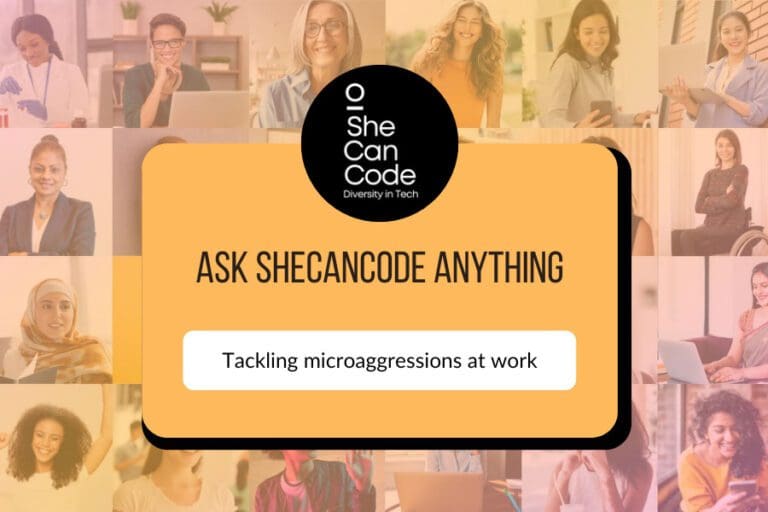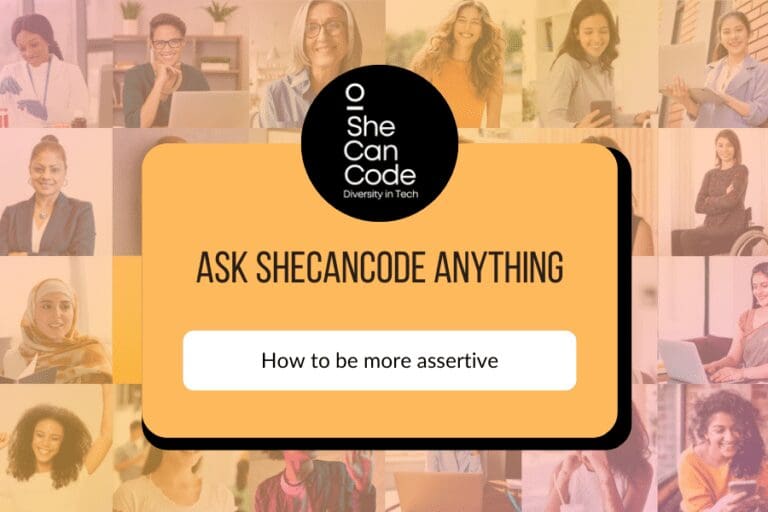THIS WEEK, WE’RE TALKING ABOUT HOW TO HANDLE MICROAGGRESSIONS AT WORK.
Microaggressions are defined as everyday subtle behaviours – whether intentional or unintentional – that communicate racism, sexism, ageism or ableism.

To help us answer this questions is coach, Fiona Hatton.
As a coach, Fiona supports women to live a happier life: through prioritising their wellbeing, doing more of what they love, and focusing on what really matters to them. She has worked with women who’ve gone on to change career, leave a toxic workplace, and make big life decisions about where (and how) they want to live.
Join the Yoco Studio community for free resources, useful tips and offers. And head to the Yoco Studio Facebook group for regular ideas and activities to boost your wellbeing.

IF YOU HAVE ANY QUESTIONS FOR US – WHETHER IT BE ABOUT WORK RELATIONSHIPS, GAINING CONFIDENCE, OR TAKING THE LEAP INTO TECH – YOU CAN ASK US ANYTHING.
Hello SheCanCode,
I wanted to get some advice, if I may – I wanted to know how you would deal with microaggressions from a colleague at work?
For a bit of background, I’m African-American woman, working as a Software Engineer. A few months ago, we had a new colleague join our team and I’ve noticed some subtle comments that I wanted to address with them, but I’m not sure how.
For example, when we were first introduced they commented that my name was so hard to pronounce. The other week, we were chatting over coffee and they asked, “where did I really come from?” At the time, I glossed over it and replied that I was born in Queens.
Since then, I’ve noticed other microaggressions and it’s starting to get me down. Do you have any advice on how to address this?
Thank you so much,
Annoyed Engineer
HEY ANNOYED ENGINEER,
Thank you so much for sharing this – it sounds like you’re going through a very challenging time, and it’s one I’m sure that others will identify with.
While these actions are called ‘micro’, their impact on mental and physical wellbeing can be significant. And calling out microaggressions can be tough, so I have some questions for you to consider before you decide what to do next.
- How do you feel?
You’ve said this behaviour is starting to get you down, how else is this person’s microaggression impacting you? Knowing your emotions can help you decide your next steps.
- What is your goal?
Think about what you want to achieve. Do you want to educate the person about why their behaviour was inappropriate, do you want to make sure it doesn’t happen again? Understanding what a good outcome looks like to you can help you decide how you want to handle the situation.
- Do you feel comfortable speaking up?
Confronting someone who has made a microaggression can be difficult, how comfortable do you feel about that? If the answer is ‘not very comfortable actually’ there are other ways to take action – for example reporting the incident to a manager or someone in HR. Whoever you speak to should take this seriously: microaggressive behaviour can create a toxic work environment, and can lead to more severe forms of harassment and discrimination.
- What do you need to look after yourself?
Whatever you choose to do, this could be an emotionally draining time. Think about where you could find extra support – perhaps friends, family, or other colleagues would be helpful?
Would developing strategies for handling similar situations in the future be useful? And what could you do outside work that would help to balance out what’s currently happening? Remember what you love – what brings you joy – how can you bring more of that into your life right now?
Above all, be kind to yourself, and know that what you’re feeling is valid.








